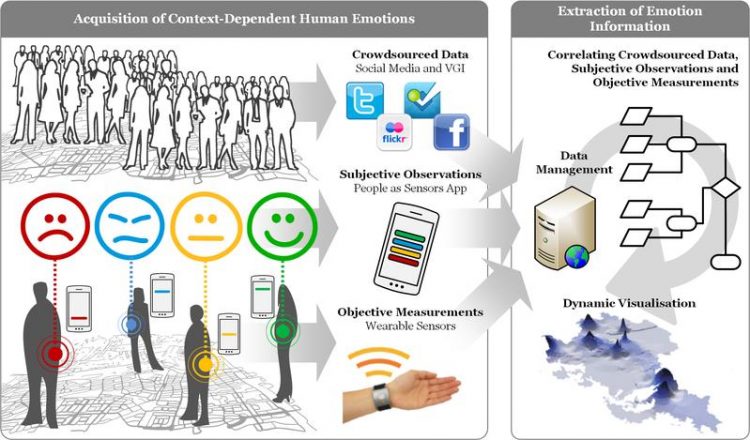Urban Design With Emotions

Research Project: "Urban Emotions” Bernd Resch
Unsafe bike paths, traffic jam stress, frightening underpasses – modern city dwellers face a number of stressors. According to experts, sustainable urban design needs to take into account citizens’ emotional responses to their environment.
In the interdisciplinary “Urban Emotions” research project, scientists from the universities in Heidelberg and Kaiserslautern are developing creative methods to capture information about those feelings from user-generated data. The data is intended to show how citizens use their city, where they feel comfortable and what conditions can evolve into problematic situations.
In search of the appropriate toolset, the researchers are testing the possibilities of the “People as Sensors” concept, which automatically measures emotions and stress levels. They are also analysing publicly available data from social networks. The research project is being funded by the German Research Foundation.
To automatically measure emotions and stress levels, the researchers outfit their test subjects with sensors, similar to a wristwatch. “That allows us to measure skin conductance, body temperature and variations in heart rate that change, for instance, when someone is startled,” explains Dr. Bernd Resch. The geoinformatics expert from the Institute of Geography at Heidelberg University leads the research project together with Dr. Peter Zeile of the Department of Regional and Environmental Planning at the Kaiserslautern University of Technology.
Measurements can point to stress-inducing trouble spots in need of improvement, such as bike paths where cyclists continually encounter dangerous situations. “The sensors allow us to capture subjective feelings of safety, such as in an underpass.
We can then check if this is a ‘scary space’ and how we can deal with it, ideally during the planning stage,” explains Bernd Resch. The data is also expected to provide insight into stress caused by noise and heat, as well as the positive impact of urban planning measures such as green space as relaxation areas.
In addition to the measurements, the researchers are evaluating publicly accessible data from social networks like Twitter, Facebook, Flickr and Instagram. “We have a wealth of subjective, user-generated data at our disposal – a well-suited source of data in a project targeted towards human personal feelings,” underscores Dr. Resch. The scientists will use these sources to validate their results by checking whether the emotions measured correlate with the subjective assessments in the social media.
“Not only is the location of the event important in the analysis, but also the semantics of the statements; therefore our innovative research approach also ties in computational linguistics,” explains the geoinformatics expert. “The computer will detect emotions in a specific context, allowing planners to better evaluate them.“
The goal of the “Urban Emotions” project is to discover how dynamic urban processes as yet unidentified can be captured and influenced using information on emotions. “Our vision is to create a system that actively involves the citizens in spatial observation. They are to help create another form of spatial perception and thus develop a new view of the city as a type of ‘organism’”, explains Dr. Zeile. The researchers are studying how to best capture emotion data, how resilient the data is and how to compile it for use in urban planning. “If successful, these new, creative methods will be a valuable addition to traditional urban planning,” says Dr. Resch.
The teams in Heidelberg and Kaiserslautern are also receiving scientific and technical support from the Center for Geographic Analysis of Harvard University, the Civic Data Design Lab of the Massachusetts Institute of Technology in Cambridge (USA), and Research Studios Austria – iSPACE in Salzburg.
Note of Dr. Bernd Resch: The project has been transferred to University of Salzburg, s. http://gepris.dfg.de/gepris/projekt/252146704 , and will be carried out as a cooperation project)
Contact:
Dr. Bernd Resch
Institute of Geography
Department of Geoinformatics
Phone +49 6221 54-5573
bernd.resch@geog.uni-heidelberg.de
Communications and Marketing
Press Office
Phone: +49 6221 54-2311
presse@rektorat.uni-heidelberg.de
Media Contact
All latest news from the category: Interdisciplinary Research
News and developments from the field of interdisciplinary research.
Among other topics, you can find stimulating reports and articles related to microsystems, emotions research, futures research and stratospheric research.
Newest articles

First-of-its-kind study uses remote sensing to monitor plastic debris in rivers and lakes
Remote sensing creates a cost-effective solution to monitoring plastic pollution. A first-of-its-kind study from researchers at the University of Minnesota Twin Cities shows how remote sensing can help monitor and…

Laser-based artificial neuron mimics nerve cell functions at lightning speed
With a processing speed a billion times faster than nature, chip-based laser neuron could help advance AI tasks such as pattern recognition and sequence prediction. Researchers have developed a laser-based…

Optimising the processing of plastic waste
Just one look in the yellow bin reveals a colourful jumble of different types of plastic. However, the purer and more uniform plastic waste is, the easier it is to…



